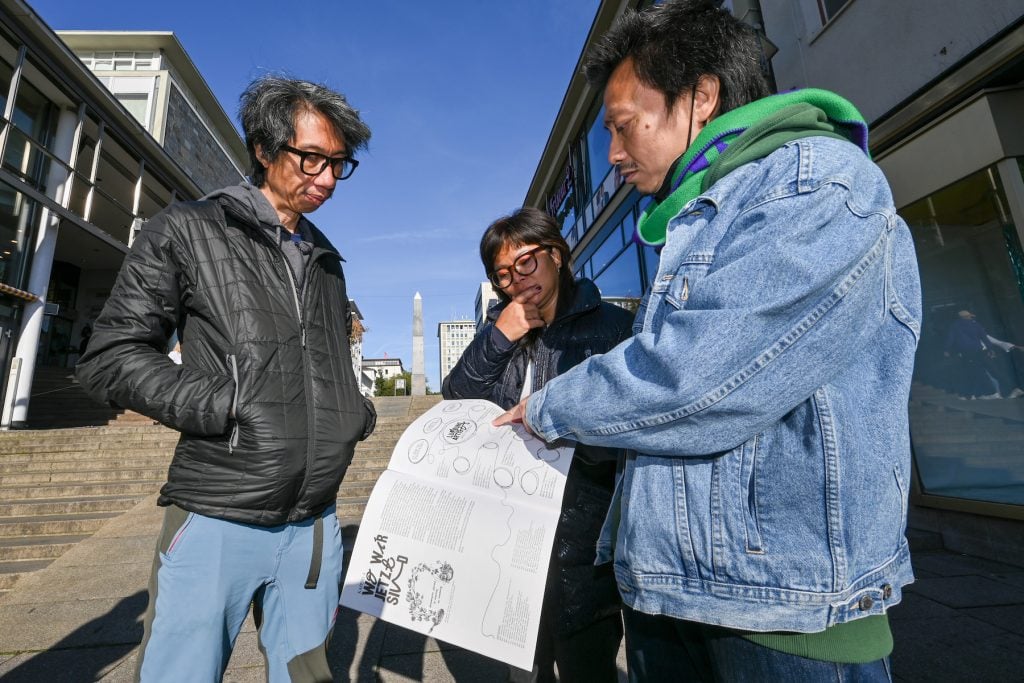Politics
Documenta Planned to Address Accusations of Anti-Semitism Through a Series of Talks—But Then Abruptly Cancelled the Program
Ruangrupa, the exhibition's organisers said that they will first let the show speak for itself.

Ruangrupa, the exhibition's organisers said that they will first let the show speak for itself.

Kate Brown

Just days ahead of its planned launch, the organizers of the German exhibition Documenta have called off a discussion series called “We need to talk! Art – Freedom – Solidarity.” The talks, which were scheduled to take places over three weeks beginning next Monday, were meant to address allegations of anti-Semitism brought against this year’s exhibition due to the origins and affiliations of a few artistic participants. Documenta vehemently denies the allegations.
“Documenta will open the exhibition and first let it speak for itself, as a basis for continuing the discussion in a productive manner,” the organizers of Documenta said in a statement announcing the talks’ suspension, sent to the media on May 4.
The Indonesia collective ruangrupa, which has been invited to curate this year’s edition of the prestigious quinquennial opening June 18 to the public, added that a “multi-perspective” dialogue beyond institutional frameworks was “unfortunately not realizable,” but hoped that the “thread of this conversation not be cut off.”
The trio of online talks, each called “Blank Spots,” set out to examine the “role of art and artistic freedom in the face of rising anti-Semitism, racism, and Islamophobia.” The first talk was to explore anti-Semitism in Germany today, with scholars Marina Chernivsky and artist Hito Steyerl among its speakers; the second would consider anti-Semitism and postcolonialism, with artist Eyal Weizman of Forensic Architecture; the third talk was to consider anti-Muslim and anti-Palestinian racism, with speakers Mezna Qato and Sultan Doughan.
The multi-day panels were formed in the wake of accusations made against Documenta 15’s organizers in January, when the group Alliance Against Anti-Semitism Kassel spoke out against the exhibition for involving “anti-Israeli activists.” They were referring to the Palestinian origins and political affiliations of two artists from the collective the Question of Funding, as well as the Ramallah, Palestine-based Khalil Sakakini Cultural Center, a member of Documenta 15’s artistic team.
Documenta’s organizers said in a statement in January that the allegations included false “representations and racist defamations”, calling them “destructive” and a hindrance to “critical dialogue and productive debate.” Ruangrupa added that the “resolute rejection of anti-Semitism, racism, extremism, Islamophobia, and any form of violent fundamentalism are the underpinnings” of their work.
The Alliance had expressed concern over some participants’ support of or connection to the BDS movement, a Palestinian-led initiative that promotes boycotts, divestment, and sanctions against Israel. The movement’s aim, according to statements on its website, is to pressure the nation to withdraw from occupied territories, remove the wall in the West Bank, and grant “full equality” to Arab-Palestinian citizens of Israel. In 2019, a majority of German federal lawmakers voted on a resolution that the BDS movement was anti-Semitic; the resolution also pledged not to fund BDS activities in Germany. The current cultural minister Claudia Roth voted against the resolution.
In their statement sent today about the suspended series, the organizers of Documenta said their decision is a result of the “concerns that have been publicly expressed in recent days.” The statement comes on the heels of news last week that the Central Council of Jews in Germany had sent a letter to German culture minister Roth, criticizing Documenta’s handling of anti-Semitism. Documenta confirmed to Artnet News that the letter sent to Roth “contributed” to their assessment to call off the talks.
Roth responded to the letter at the time, expressing her support for Documenta and emphasizing Germany’s responsibility to deal with anti-Semitism and to maintain artistic freedom. Roth added in her statements to DPA that “origin alone cannot be the determining factor in what is shown and what is not.”
In the letter seen by the German press, Josef Schuster, president of the Central Council of Jews in Germany, had specifically addressed the planned panels, saying that the Documenta talks exhibited “a clear bias against anti-Semitism.”
In a statement sent to Artnet News about the suspension, Roth emphasized the seriousness of the allegations and her interest in speaking to all parties, including Documenta’s organizers, the Central Council of Jews and Schuster. “The cancellation of the series of talks makes it clear that a new basis of trust is obviously needed,” she added. “Anti-Semitism must have no place in our society, anywhere, not even at Documenta.”
She added that she will seek dialogue with all those involved and, if needed, bringing them together to discuss the matter.
“However, it is also the task of all state agencies to protect artistic freedom and thus a freedom for artists and their work, which can lead to different interpretations and does not have to please everyone equally,” Roth added. “We need an open and balanced international discussion about Documenta that reflects and includes different positions.”
The exhibition’s organizers stated that they hope discussions will take place on-site in Kassel during Documenta 15.
Update May 5: An earlier version of this article stated that culture minister Claudia Roth voted in favor of the resolution on BDS—this is incorrect and the article has been amended.